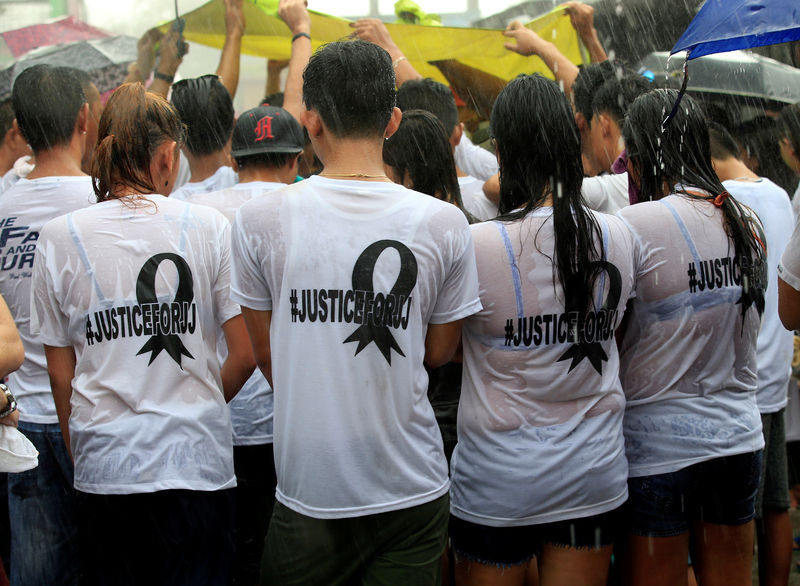By Martin Petty
MANILA (Reuters) - A young man's body lay in a pool of blood, surrounded by bullet casings. A loved one rushed to the scene in the dark, rundown Manila neighbourhood and howled in anguish as onlookers huddled behind a police cordon.
It's a scene that has been replayed thousands of times in Philippine President Rodrigo Duterte's brutal war on drugs over the past seven months.
But this was on Tuesday night, a day after Philippine police were ordered to halt anti-drugs operations that have left more than 2,500 people dead in what police say are shootouts.
Thousands of users and small-time dealers have also been killed outside of the police anti-drugs missions. Human rights groups say many are by assassins paid by police, or are police themselves. Police deny involvement in extra-judicial killings.
Aldrin de Guzman, 24, was gunned down outside his home before midnight on Tuesday in circumstances all-too-familiar for the dwellers of Manila's poorest neighbourhoods.
Another man was shot and killed in a crumbling shophouse not too far away, at around the same time.
Mystery gunmen on a motorcycle shot de Guzman repeatedly, according to police, following the same pattern as thousands of other vigilante-style killings of drug dealers and users.
De Guzman's mother, Elisa, said her son had no enemies, but had used drugs in the past.
"That's a long time ago. If the person is already reforming, they still do this?" she said, tears building in her eyes.
"They should stop all these shootings... many are caught in between, just like my son. They should stop claiming lives."
No witnesses saw the killers.
The attack bore the same hallmarks as many of the other killings over the past seven months activists believe are carried out by hit men working in cahoots with police, or by officers in plain clothes.
The Philippine National Police (PNP) has said allegations that hit men were on the police payroll "are obviously not the norm" and the PNP was making "significant breakthroughs" in investigations into killings.
KILLING IN A SHOPHOUSE
Duterte has suspended drugs operations to allow a purge of corrupt police following the kidnapping and killing of a South Korean businessmen by counter-narcotics officers. He has handed over charge of the anti-drugs campaign to the Philippine Drugs Enforcement Agency, a body a fraction of the size of the national police.
A report by Amnesty International on Wednesday said its investigation showed drugs killings were "systematic, planned and organised", and police had even received money for murders and for delivering bodies to funeral homes.
Not far from the where Guzman's body lay for hours on Tuesday night, crowds gathered next to crumbling buildings along a narrow, poorly-lit alley where another killing took place.
Police stood by, some playing on their smartphones, awaiting the arrival of a funeral home vehicle to take away the corpse of an unidentified man killed around the same time.
Witnesses said he was chased by gunmen onto the second floor of a shophouse before the shots were fired. They did not know who pulled the trigger.
"I heard two gunshots. I was in the hallway, opened the door and saw his body slumped over," said neighbour Fernando Briones, 51.
"He was shot in the forehead and neck."
A woman described by onlookers as the victim's mother declined to speak to media but spoke out aloud as police ushered neighbours behind a thin piece of rope that was used as a cordon.
"He was a user, but he'd stopped," she said.

"He was running away, but they still shot him."